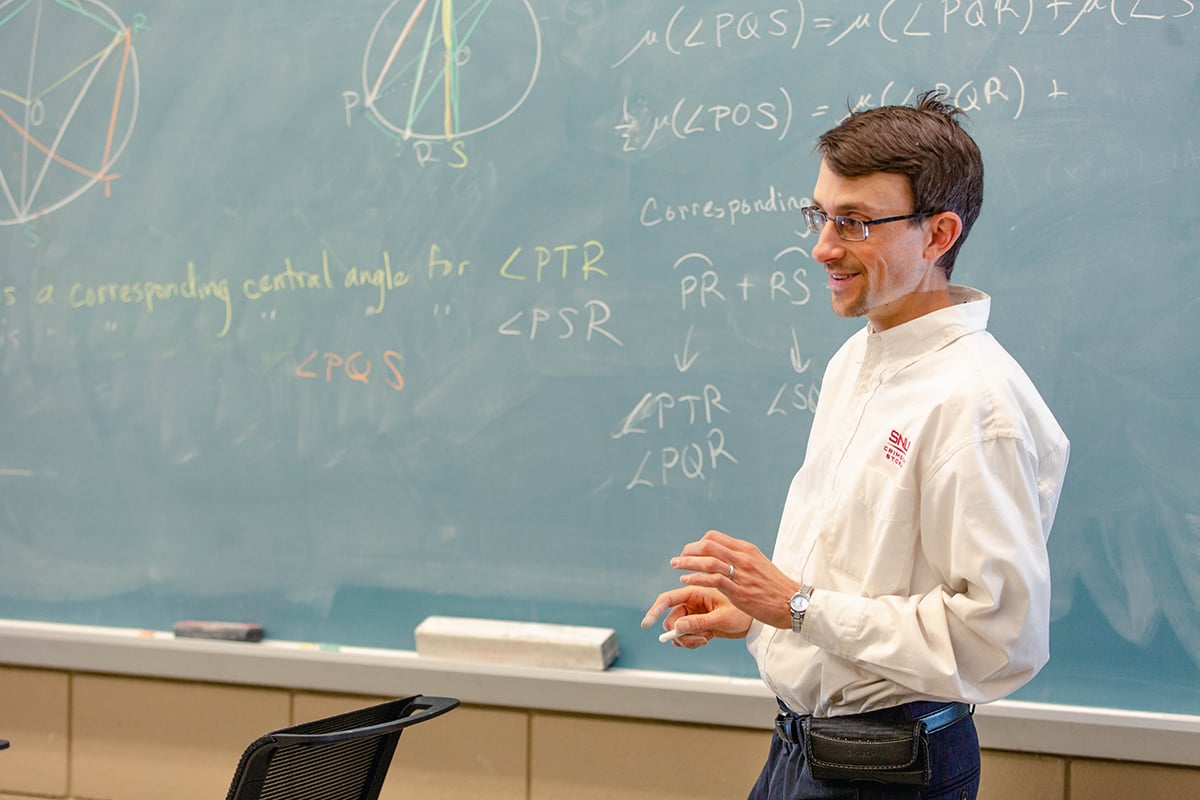Everything About Competent Math Teachers: Their Role in Fostering Pupil Growth and Success in Math Education And Learning
Qualified mathematics educators are crucial fit trainees' understanding and recognition of mathematics. Their deep knowledge and reliable teaching methods can substantially influence trainee results. These educators not just impart mathematical skills but additionally cultivate an inclusive environment that satisfies varied discovering requirements. As they embrace cutting-edge techniques, the inquiry arises: just how do these approaches specifically improve student engagement and accomplishment in mathematics?
The Significance of Qualified Mathematics Teachers in Education
Several elements contribute to pupil success in maths, the visibility of certified math instructors stands out as a critical aspect in cultivating reliable discovering environments. Study consistently shows that pupils taught by teachers with solid mathematical histories have a tendency to show greater degrees of understanding and achievement. Certified math teachers not just possess a deep understanding of mathematical principles yet additionally the pedagogical abilities needed to communicate complex concepts in obtainable methods. They can identify pupils' private requirements and adjust their mentor methods as necessary, advertising inclusivity and interaction. In enhancement, their proficiency allows them to create a favorable class environment that motivates risk-taking and strength in analytical. This supportive setting promotes a growth state of mind among pupils, enhancing their confidence and motivation in maths. In general, certified mathematics educators play an important role fit pupils' mindsets toward mathematics, ultimately influencing their future chances and scholastic trajectories.
Key Qualities of Efficient Mathematics Educators
Reliable math teachers have numerous key top qualities that enhance their teaching performance. These include deep subject expertise, strong communication skills, and flexible teaching methods that deal with diverse understanding requirements. Recognizing and cultivating these features can significantly influence student understanding and engagement in maths.
Deep Topic Expertise
While a strong instructional method is very important, deep subject knowledge continues to be a foundation of efficient math instructors. Such expertise makes it possible for educators to understand mathematical concepts thoroughly and to anticipate trainee misconceptions. Educators with a solid understanding of math not just supply web content with self-confidence yet additionally link different topics, fostering a richer knowing atmosphere. They are outfitted to apply diverse training techniques that cater to various learning designs, making complex concepts extra available. In addition, deep subject knowledge empowers teachers to take part in purposeful conversations with trainees, encouraging important reasoning and analytic skills. Eventually, the depth of understanding that math educators possess greatly affects students' academic growth and success in maths, laying a solid foundation for future learning.

Solid Interaction Skills
Deep subject understanding alone wants for promoting an efficient discovering atmosphere in mathematics; solid communication abilities are similarly essential for effective math educators. These skills allow teachers to communicate complicated ideas in available means, making certain that students understand fundamental concepts. Effective interaction involves not only quality however likewise the capability to proactively pay attention, motivating trainee engagement and resolving misconceptions. By cultivating an open discussion, teachers develop a supportive class environment where students feel comfy asking inquiries and sharing their thoughts. In addition, strong communicators can adjust their language and descriptions to match diverse learning designs, enhancing student involvement and understanding. Eventually, reliable interaction bridges the gap in between a teacher's expertise and a trainee's understanding, greatly impacting academic success in maths.
Flexible Training Methods
A selection of flexible mentor methods are vital for reliable mathematics teachers intending to meet the diverse needs of their students. These techniques make it possible for teachers to tailor their instruction based upon private learning passions, styles, and capabilities. qualified math teachers. Strategies such as separated guideline, where teachers modify procedure, web content, or product, assistance address varying efficiency levels. In addition, including innovation and interactive tools can boost engagement and assist in tailored understanding experiences. Formative evaluations allow educators to keep track of progress and readjust mentor approaches accordingly. Joint team work promotes peer learning, cultivating an encouraging environment. By using these flexible methods, mathematics educators can create comprehensive class that motivate all pupils to grow and accomplish their academic goals, ultimately cultivating a love for maths
Cutting-edge Training Methods Utilized by Mathematics Educators
As instructors look for to engage trainees better, cutting-edge mentor approaches have actually become a focal point in math classrooms. These methods intend to improve understanding and retention of mathematical concepts. One famous method is using technology, such as interactive software application and online simulations, which enables students to visualize complex problems and receive immediate feedback.Additionally, project-based learning motivates collaboration and real-world application of mathematics principles, cultivating critical thinking skills. Gamification, where mathematics ideas are incorporated right into game-like atmospheres, has actually also acquired appeal, making discovering more enjoyable and encouraging for students.Moreover, separated instruction tailors lessons to suit varying skill levels, making certain that all trainees can advance at their own speed. By employing these innovative methods, math teachers develop vibrant learning experiences, ultimately advertising greater pupil growth and achievement in mathematics.
Producing Inclusive Discovering Environments
Creating inclusive knowing atmospheres in mathematics education and learning includes applying diverse understanding methods and fostering joint team activities. These methods accommodate the different requirements of students, making sure that everybody has the chance to engage and succeed. By prioritizing inclusivity, mathematics instructors can grow a classroom atmosphere that sustains all learners.
Varied Discovering Approaches
While many instructors undertaking to foster inclusive understanding atmospheres, applying varied learning approaches is crucial for effectively reaching all students. These strategies incorporate a series of mentor approaches customized to suit varying finding out styles, capacities, and histories. For important site instance, incorporating aesthetic help, manipulatives, and innovation can involve trainees that may have problem with standard direction. Additionally, distinguished instruction permits instructors to change evaluations and projects, guaranteeing that every student can access the curriculum at their very own level. Culturally responsive pedagogy also plays a significant duty in identifying and valuing the varied experiences of trainees, thus enhancing their link to the material. By utilizing these varied discovering approaches, certified math educators can produce an encouraging atmosphere where all trainees are encouraged to do well in maths.
Collaborative Team Activities

The Effect of Qualified Math Teachers on Pupil Achievement
The visibility of visite site certified math teachers significantly influences pupil success, as efficient guideline can bridge voids in understanding and foster a positive learning environment. Research study suggests that pupils shown by experienced educators demonstrate greater degrees of proficiency in mathematical concepts contrasted to their peers. Certified mathematics instructors possess a deep understanding of mathematical content, allowing them to present material in varied methods that cater to various finding out styles. This versatility not just enhances understanding yet also enhances student confidence in their abilities.Moreover, certified teachers often utilize developmental assessments to keep an eye on pupil development, enabling for prompt interventions when necessary. Their capability to create interesting lessons encourages student engagement and promotes a development mindset. Therefore, the influence of qualified math educators extends past mere scholastic performance; it grows a sense of curiosity and resilience in students, eventually bring about improved results in maths and a stronger foundation for future learning.
Methods for Engaging Students in Mathematics
Involving students in mathematics needs a complex technique that includes varied approaches to capture their interest and boost understanding. One effective method is making use of real-world applications, enabling students to see the importance of mathematical principles in daily life. Integrating innovation, such as interactive software and on-line sources, can additionally promote engagement by giving dynamic knowing experiences.Group work encourages partnership, allowing trainees to gain from one another and create analytical skills in a supportive environment. In addition, integrating video games and hands-on tasks can make discovering more accessible.differentiated and pleasurable direction deals with different discovering designs, making certain that all trainees can get in touch with the material. Supplying timely feedback assists students acknowledge their development and areas for enhancement, fostering a growth frame of mind. By using these strategies, teachers can create an engaging mathematics classroom that promotes pupil development and success.
The Role of Expert Growth in Enhancing Mathematics Mentor Abilities
While lots of teachers acknowledge the importance of reliable mentor strategies, expert development plays a necessary duty in boosting mathematics teaching skills (qualified math teachers). Constant training chances enable teachers to remain existing with pedagogical innovations, mathematical web content, and technical devices. Workshops and workshops offer discussion forums for teachers to work together, share best practices, and go over obstacles they encounter in the classroom.Furthermore, professional development cultivates a growth attitude amongst educators, motivating them to assess their practices and adjust their methods based upon pupil requirements. This ongoing discovering process not just enhances teachers' mathematical understanding however also equips them with ingenious instructional strategies that can lead to enhanced pupil involvement and achievement.Ultimately, a structured specialist development program can greatly affect the high quality of math education, making certain that educators are well-prepared to motivate and assist their pupils towards success in mathematics
Often Asked Inquiries
What Certifications Are Required to Become a Mathematics Educator?
To become a math teacher, people commonly require a bachelor's level in maths or education, mentor qualification, and a solid understanding of mathematical principles. Added qualifications might include specialized training in rearing and classroom monitoring skills.

Exactly How Do Math Teachers Assess Student Progression in the Classroom?
Math instructors evaluate pupil development via various methods, including tests, tasks, and tests (qualified math teachers). They likewise make use of observational assessments and student involvement to evaluate understanding, changing direction based upon specific and team performance to enhance finding out outcomes
What Obstacles Do Math Teachers Commonly Face?
Math educators commonly face challenges such as differing trainee skill levels, limited resources, educational program constraints, and the need to engage trainees successfully. In addition, they commonly encounter stress to enhance standardized examination ratings and take care of class behavior.
How Can Parents Support Their Child's Mathematics Education and learning?
Parents can support their child's mathematics education by supplying a conducive learning atmosphere, participating in math-related activities, motivating a favorable perspective in the direction of obstacles, and keeping open interaction with instructors to keep track of progress and address worries.
What Resources Are Available for Mathematics Educators to Enhance Their Abilities?
Numerous sources are readily available for math instructors, consisting of on-line programs, expert development workshops, peer partnership teams, educational internet sites, click over here and training journals. These devices improve training strategies, deepen subject understanding, and ultimately enhance student knowing outcomes in maths. Qualified mathematics teachers are important in forming trainees' understanding and appreciation of mathematics. Lots of factors add to trainee success in mathematics, the presence of qualified mathematics teachers stands out as a crucial component in cultivating effective learning settings. Additionally, certified mathematics educators assist in these communications by purposefully organizing trainees, ensuring that each team consists of a mix of ability degrees and backgrounds. The visibility of qualified math educators substantially affects trainee success, as efficient direction can connect gaps in understanding and foster a positive learning setting. Mathematics educators frequently encounter difficulties such as varying student skill levels, restricted resources, educational program constraints, and the demand to engage trainees efficiently.
Comments on “How qualified math teachers create culturally responsive classrooms”